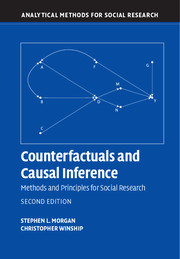Book contents
- Frontmatter
- Dedication
- Contents
- List of Figures
- List of Tables
- Acknowledgments for First Edition
- Acknowledgments for Second Edition
- I Causality and Empirical Research in the Social Sciences
- II Counterfactuals, Potential Outcomes, and Causal Graphs
- III Estimating Causal Effects by Conditioning on Observed Variables to Block Back-Door Paths
- 4 Models of Causal Exposure and Identification Criteria for Conditioning Estimators
- 5 Matching Estimators of Causal Effects
- 6 Regression Estimators of Causal Effects
- 7 Weighted Regression Estimators of Causal Effects
- IV Estimating Causal Effects When Back-Door Conditioning Is Ineffective
- V Estimation When Causal Effects Are Not Point-Identified by Observables
- VI Conclusions
- References
- Index
7 - Weighted Regression Estimators of Causal Effects
Published online by Cambridge University Press: 05 December 2014
- Frontmatter
- Dedication
- Contents
- List of Figures
- List of Tables
- Acknowledgments for First Edition
- Acknowledgments for Second Edition
- I Causality and Empirical Research in the Social Sciences
- II Counterfactuals, Potential Outcomes, and Causal Graphs
- III Estimating Causal Effects by Conditioning on Observed Variables to Block Back-Door Paths
- 4 Models of Causal Exposure and Identification Criteria for Conditioning Estimators
- 5 Matching Estimators of Causal Effects
- 6 Regression Estimators of Causal Effects
- 7 Weighted Regression Estimators of Causal Effects
- IV Estimating Causal Effects When Back-Door Conditioning Is Ineffective
- V Estimation When Causal Effects Are Not Point-Identified by Observables
- VI Conclusions
- References
- Index
Summary
With an Extended Example of a Weighted Regression Alternative to Matching
In the last chapter, we argued that traditional regression estimators of casual effects have substantial weaknesses, especially when individual-level causal effects are heterogeneous in ways that are not explicitly parameterized. In this chapter, we will introduce weighted regression estimators that solve these problems by appropriately averaging individual-level heterogeneity across the treatment and control groups using estimated propensity scores. In part because of this capacity, weighted regression estimators are now at the frontier of causal effect estimation, alongside the latest matching estimators that are also designed to properly handle such heterogeneity.
In the long run, we expect that weighted regression estimators will prove to be a common choice among alternative conditioning procedures that are used to estimate causal effects. In fact, we expect that weighted regression estimators will be used more frequently than the matching estimators presented in Chapter 5 when there is good overlap in the distributions of adjustment variables across the treatment and control groups. We have four primary reasons for this prediction, each of which we will explain in this chapter. First, weighted regression estimators allow the analyst to adopt the spirit of matching, and the clear thinking that it promotes, within a mode of data analysis that utilizes widely available software and that is familiar to most social scientists.
- Type
- Chapter
- Information
- Counterfactuals and Causal InferenceMethods and Principles for Social Research, pp. 226 - 264Publisher: Cambridge University PressPrint publication year: 2014



